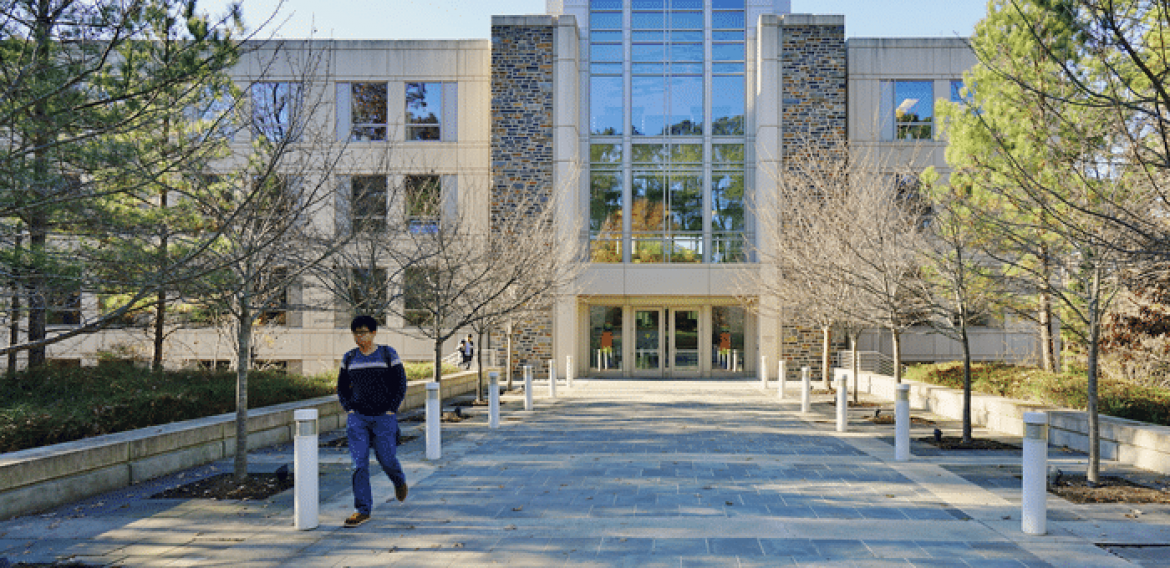Fuqua School of Business – Admissions Interview
Shari Hubert, Associate Dean of Admissions at Duke University – The Fuqua School of Business
- What’s the single most exciting development, change, or event happening at your MBA program this coming year?
We are always looking for ways to better prepare our students to navigate the most relevant business challenges and current industry trends. Today that includes preparing graduates to address the pressing societal challenge of climate change. Business is uniquely positioned to provide solutions to climate change and increasingly, there is an expectation that businesses, not governments, will provide the needed solutions. Fortunately, we have faculty at Fuqua who deeply understand the forces at play across disciplines—from finance, accounting, operations, strategy, management, and beyond. They are committed to research and translating their insights in the classroom.
This is happening in real-time. In the short term, those efforts have resulted in new MBA courses that focus deeply on the intersection of business with climate and sustainability, including courses in Climate, Sustainability, and Corporate Governance; Sustainable Operations; Business Sustainability Reporting and Analysis; and Global Academic Travel Experience: Climate and Sustainability in the Nordic Countries, which includes student travel to Denmark and Norway.
All those courses are new at Fuqua within the last three years. Beyond that, our Center for Energy, Development, and the Global Environment (EDGE) offers a seminar course. One of our expert colleagues at Duke’s Nicholas School for the Environment teaches an Energy Markets course. Together, these courses provide students a framework to provide leadership in how their organizations consider and respond to climate change and sustainability issues.
Duke University is also bringing attention and resources to bear toward climate action through the Duke Climate Commitment. You can read more about that initiative here.
2) What 2-3 qualities, skill sets, experiences does your program value most in applicants?
- Having a “Team Fuqua” mindset
Fuqua places a strong emphasis on teamwork, shared success, and building a supportive community. The culture is often described as “Team Fuqua,” reflecting the belief that the collective strength of a diverse team can accomplish far more than individuals alone. Therefore, applicants should demonstrate respect for others’ ideas, have a track record of contributing to team success, and show genuine enthusiasm for collaborative problem-solving.
- Contributing to others and making an impact
Beyond professional and academic achievements, Fuqua values individuals who give back to the communities around them—whether that’s in the workplace, a local nonprofit, or a global initiative—in unique ways, such as volunteering, mentoring, leading an affinity group, or starting a community project. Our culture is very student-driven; therefore, we seek students who will continue to shape and contribute to their peers’ experiences while in the program.
- Demonstrating leadership potential and adaptability
Given the rapidly changing business environment, Fuqua aims to develop leaders who are adaptable, creative, and confident in navigating uncertainty. We want students who can handle new challenges and demonstrate resilience in the face of setbacks. Show us a history of taking initiative, driving innovation, or overcoming significant obstacles. Applicants should be able to articulate moments where they embraced change or led initiatives that required quick thinking and flexibility.
3) How does your team approach the essay portion of the application specifically?
Fuqua’s Daytime MBA application includes two essays and a few optional short answer questions. We often hear that our iconic 25 Random Things essay is one of MBA applicants’ favorite essays. Our team loves reading the random things essays because it is truly a blank canvas. A tip for this essay: Use this space to tell us new things about yourself that we’re not already learning in other parts of your application, including your resume. You should feel comfortable sharing personal accomplishments, hopes, fears, desires, and more.
The second essay question invites applicants to share three ways they see themselves engaging with the Fuqua community. We want to know what it is about Fuqua that interests them. Because there are so many clubs and activities available to students, it’s important for applicants to spend some time reflecting on what they want to accomplish at Fuqua.
A couple of years ago, we decided to add a few optional short answer questions to get to know applicants better. This section provides applicants with a space to share their upbringing, unique personal or professional situations and other circumstances that help us understand their lived experience.
4) Do you have any application tips (for essays & recommendations) for MBA applicants? Are there common mistakes that applicants should try to avoid?
My first piece of advice is to be authentic! We want to get to know the person behind the application. Second, applicants should be transparent about areas of their application that may not speak to their strengths, like an employment gap or test choices. When an applicant is proactive about addressing those areas, it shows us in Admissions that they are self-aware and have a desire to improve.
5) How important is standardized testing for an MBA application to Fuqua, and is there a preference for GMAT, GRE, EA for your full-time program?
We require applicants to submit either the GMAT, GRE, or Executive Assessment. There is no preference for which test an applicant takes as all options have proven to be relevant in our assessment of Fuqua-readiness.
6) What resources are available at your MBA program to assist with internship and full-time job opportunities)?
Our students seek a wide spectrum of post-MBA roles, and Fuqua’s Career Management Center (CMC) is built to empower successful career searches across all industries. Programming in the classroom, small group and individual sessions, and industry-focused mentoring—these are just a few of the resources offered by the CMC. In addition to MBA career coaches, the CMC has an established team of career professionals who develop employer relations and create student-employer engagement opportunities.
International students must navigate unique aspects of their career searches. It’s important to note that Fuqua’s Daytime MBA carries a science, technology, engineering and math (STEM) designation, which allows international students to work in the U.S. for a total of three years if they meet certain requirements. Beyond that, our CMC collaborates with Fuqua’s International Programs Office and other teams to fully support international students seeking employment in the U.S. or internationally.
This truly just scratches the surface of Fuqua’s robust career resources. More information can be found here.
7) What is the one aspect of your program that you wish applicants knew more about?
How cool Durham is to live! Durham blends the best of a thriving urban center with the charm of a close-knit community—making it an ideal place to pursue your MBA. As part of the renowned Research Triangle region, the city boasts a vibrant startup and tech scene, offering ample networking and career opportunities.
Durham’s food scene is frequently celebrated for its eclectic restaurants, craft breweries, and lively nightlife creating a cultural hub that extends well beyond campus. Beyond the city streets, you’ll find parks, scenic trails, and opportunities for weekend adventures across the Raleigh-Durham-Chapel Hill area.
Equally important, Durham offers a relatively low cost of living compared to major metropolitan areas, so your budget can stretch further. And thanks to the nearby Raleigh-Durham International Airport (RDU), major business and cultural hubs like New York, San Francisco, Boston, and Washington, D.C., are only a quick flight away—perfect for attending conferences, networking events, an interview, or weekend getaways. One student even traveled to New York four times in one month for a networking trip and internship interviews.
8) Fun Fact about Fuqua— such as where is a favorite hangout for your MBA students?
Fuqua students enjoy and create many traditions for spending time together, but Fuqua Friday is certainly the most popular. It’s a weekly event open to the entire Fuqua community, including students, faculty, staff, and their families, to enjoy food, activities, and entertainment. It’s sponsored by the MBA Association, Fuqua’s student-run government, and is often held in collaboration with a club to set a theme. Past themes include Diwali, Halloween, Global Week, Mid-Autumn Festival, and more. So, not only is it a weekly outlet for students to connect and unwind, it’s often an opportunity to share and learn about their cultures.



